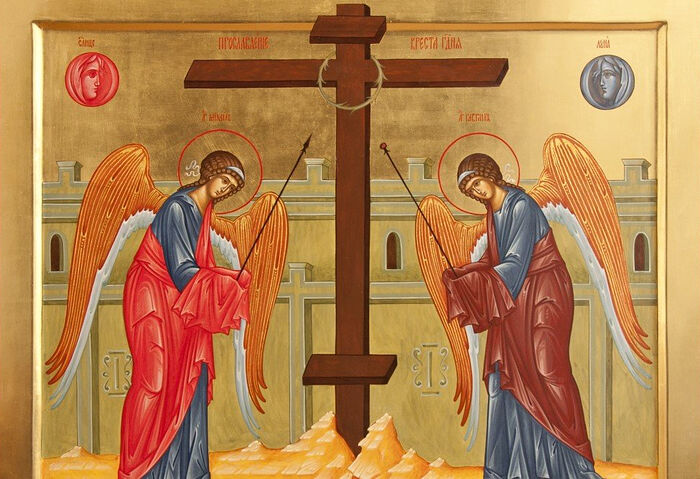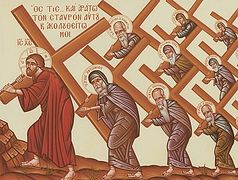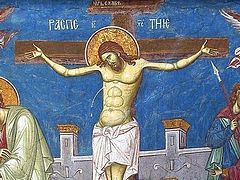For the message of the cross is foolishness to those who are perishing, but to us who are being saved it is the power of God. For it is written: Where is the wise? Where is the scribe? Where is the disputer of this age? Has not God made foolish the wisdom of this world? For since, in the wisdom of God, the world through wisdom did not know God, it pleased God through the foolishness of the message preached to save those who believe. For Jews request a sign, and Greeks seek after wisdom; but we preach Christ crucified, to the Jews a stumbling block and to the Greeks foolishness, but to those who are called, both Jews and Greeks, Christ the power of God and the wisdom of God. (1 Corinthians 1:18-24)
‘Wisdom’ was something valued and sought after not only in Judaism but in pagan religions and in pagan philosophy as well. Israel had an entire tradition of Wisdom literature, as did several of its neighboring empires. It had wisdom teachers among its saints, kings and prophets. Israel’s Wisdom tradition was thought to be enriched by contact with these other cultures, even when these empires were Israel’s enemies.
Israel, however, did not think of Wisdom as being the discovery of the wisest philosophers. Rather, Israel believed Wisdom was revealed by God and was in fact divine. Thus, it is natural for St Paul to connect the Gospel with Wisdom, for the Gospel is pure divine revelation. Christ is the fullness of God’s revelation and so the title Wisdom is applied to Him as well.
“The tension between Gospel and Law is resolved by the identification of Christ with Wisdom-Torah. The apostle hopes in this way to rescue his gospel from the stigma of absolute opposition to the law. . . . The righteousness based on faith does not annul the law but brings it to its true goal, for ‘the word of faith which we preach’ is Jesus Christ, incarnate wisdom, telos nomou.” (M. Jack Suggs in ECHOES OF SCRIPTURE IN THE LETTERS OF PAUL, p 80)
Ultimately, the Law (Torah) and Wisdom are both witnesses to the Christ and are contained in His person. Since Christ fulfills the Law and the prophets, they all are contained in Him, the Word of God incarnate. The early Christians realized that not only was Jesus a wisdom teacher (His parables for example are in the wisdom tradition and in Mark 6:2 the people are astonished by Jesus’ teachings – what wisdom is given to Him!) but He is Wisdom incarnate. Jesus is who the entire wisdom tradition speaks about, and so we only come to understand wisdom when we come to faith in Jesus Christ. That is why for a long time in early Christian catechism Proverbs was a main focus of the teaching (which is reflected in the fact that we Orthodox read Proverbs on the weekdays of Great Lent when catechetical training took place in the early church). St Neilos the Ascetic offers a stinging criticism of pagan Greek philosophers and why they fail to recognize Jesus Christ as Wisdom.
Many Greeks and not a few Jews attempted to philosophize; but only the disciples of Christ have pursued true wisdom, because they alone have Wisdom as their teacher, showing them by His example the way of life they should follow. For the Greeks, like actors on a stage, put on false masks; they were philosophers in name alone, but lacked true philosophy. They displayed their philosophic calling by their cloak, beard and staff, but indulged the body and kept their desires as mistresses. They were slaves of gluttony and lust, accepting this as something natural. They were subject to anger and excited by glory, and they gulped down rich food like dogs. They did not realize that the philosopher must be above all a free man, and not a slave of the passions who can be bought or sold. A man of upright life can be the slave of others and yet suffer no harm; but to be enslaved to the passions and pleasures brings a man into disgrace and great ridicule. (The Philokalia, Kindle Loc. 6005-13)
St. Maximos the Confessor believes the incarnation itself reveals the Wisdom of God. The incarnation was the mystery God hid from all eternity – thus the incarnation itself is God’s wisdom. St Paul proclaims: To me, though I am the very least of all the saints, this grace was given, to preach to the Gentiles the unsearchable riches of Christ, and to make all men see what is the plan of the mystery hidden for ages in God who created all things; that through the church the manifold wisdom of God might now be made known to the principalities and powers in the heavenly places. This was according to the eternal purpose which he has realized in Christ Jesus our Lord, in whom we have boldness and confidence of access through our faith in him (Ephesians 3:8-12). In revealing a true human being, Jesus is revealing wisdom incarnate. Maximos writes:
The wisdom of God is revealed in His becoming by nature a true man. His justice is shown by His assumption, at His nativity, of a passible nature identical to our own. His might is shown by His creation, through His suffering and death, of a life that is by nature eternal and of a state of dispassion that is immutable.” (THE PHILOKALIA, Kindle Loc. 18910-13)
Again, St Paul writes: I became a minister according to the divine office which was given to me for you, to make the word of God fully known, the mystery hidden for ages and generations but now made manifest to his saints. To them God chose to make known how great among the Gentiles are the riches of the glory of this mystery, which is Christ in you, the hope of glory. Him we proclaim, warning every man and teaching every man in all wisdom, that we may present every man mature in Christ (Colossians 1:25-28).
It turns out that the incarnation was not God’s reaction or response to human sin. Rather, it was God’s plan from eternity. Before there ever was a human created, God had planned and intended to die on the cross in order to reveal not only God’s love for us, but that God is love and thus will do everything to restore humanity’s communion with God. Thus, our sin did not ’cause’ the crucifixion of our Lord Jesus Christ. Rather, God knew creating humans meant He would have to die on the cross in order to maintain communion with us. God intended this from eternity, finally revealing Himself, His plan and our salvation in Jesus Christ.
Thus, the cross is a sign of God’s love and wisdom which is why we read Proverbs 3:18 on the eve of the Feast of the Exaltation of the Cross. She is a tree of life to those who take hold of her, and happy are all who retain her. Wisdom is the tree of life – Wisdom is the cross which saves all of us and through which we are united to God’s love for humankind.




